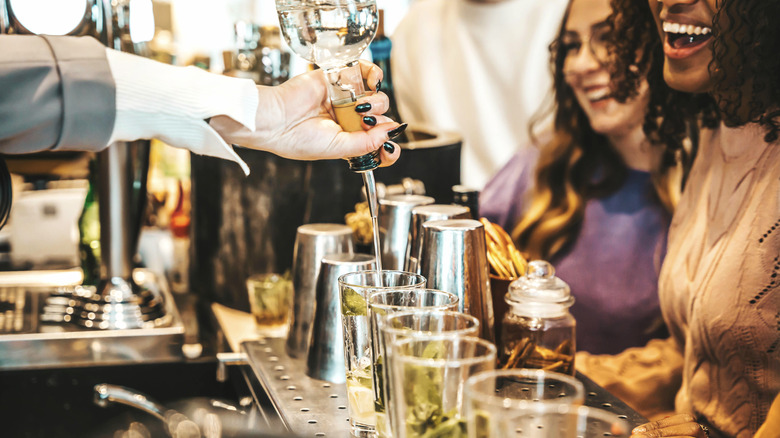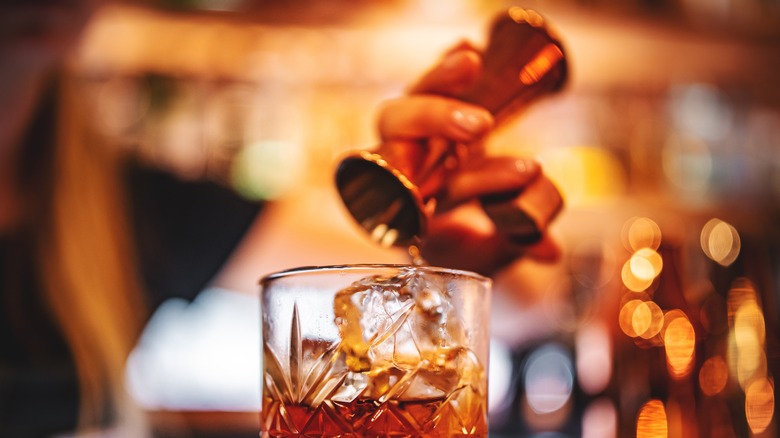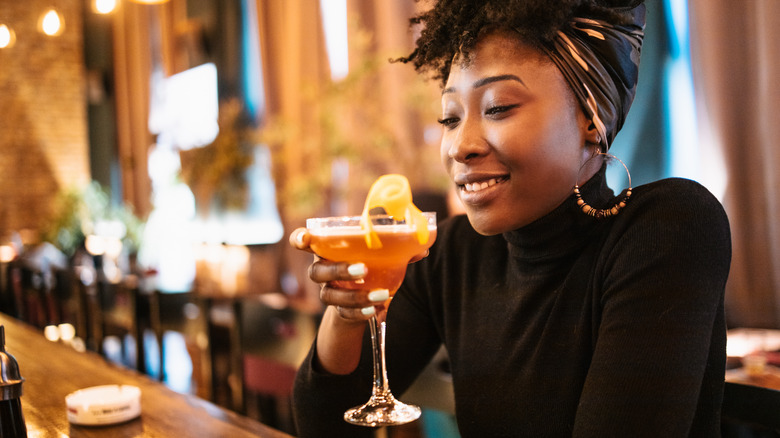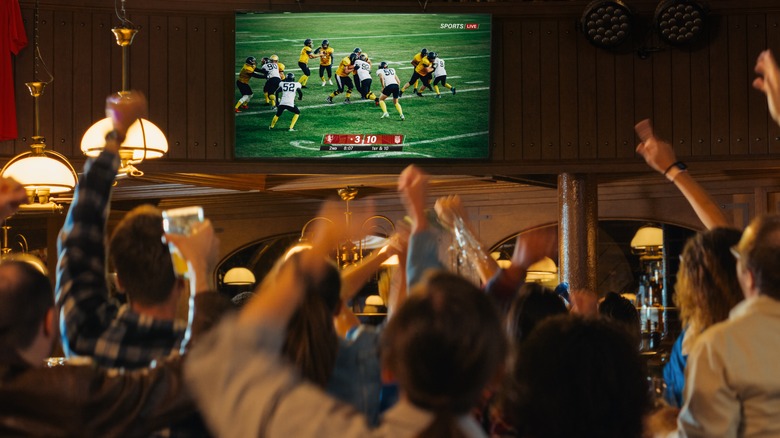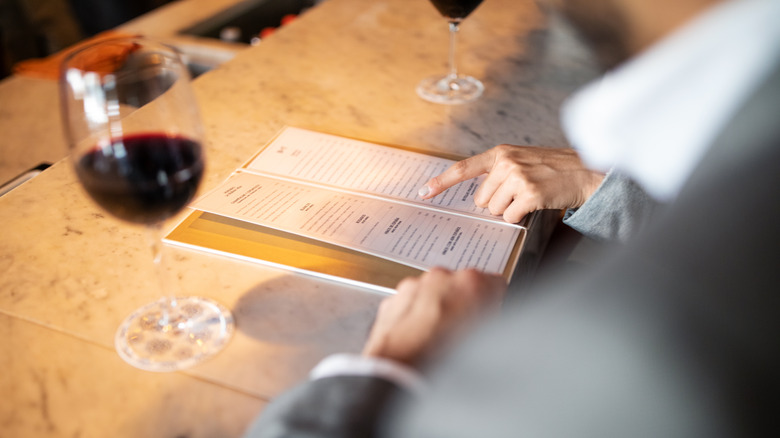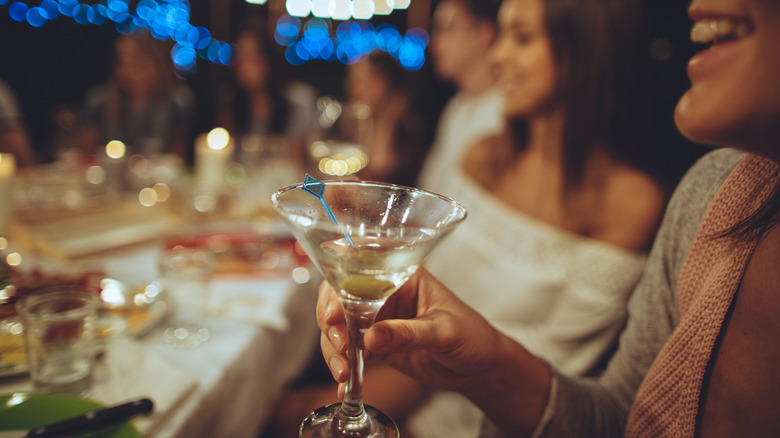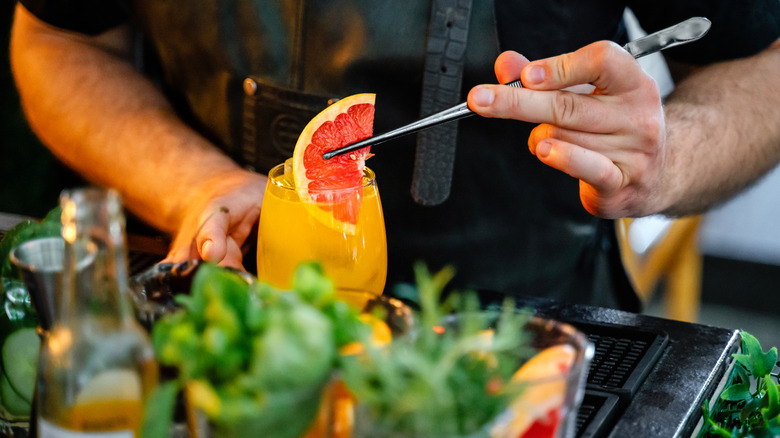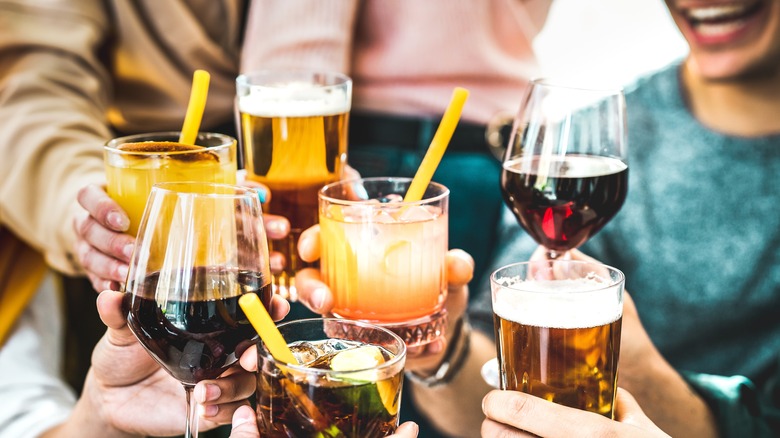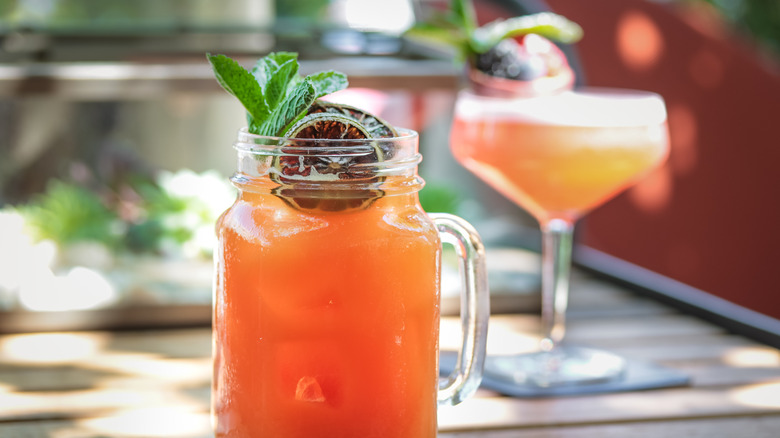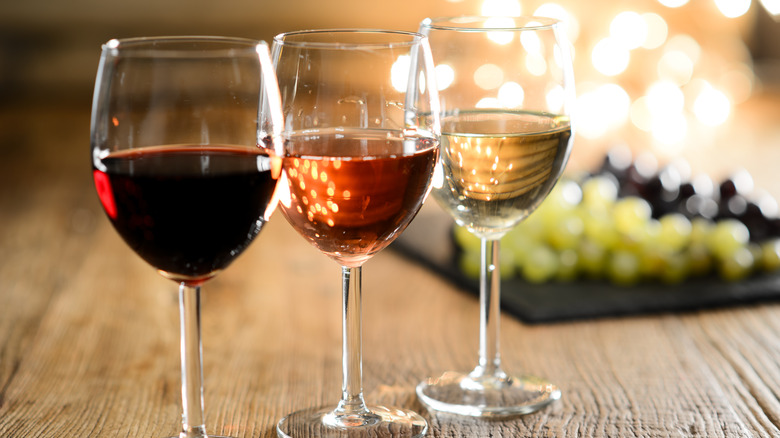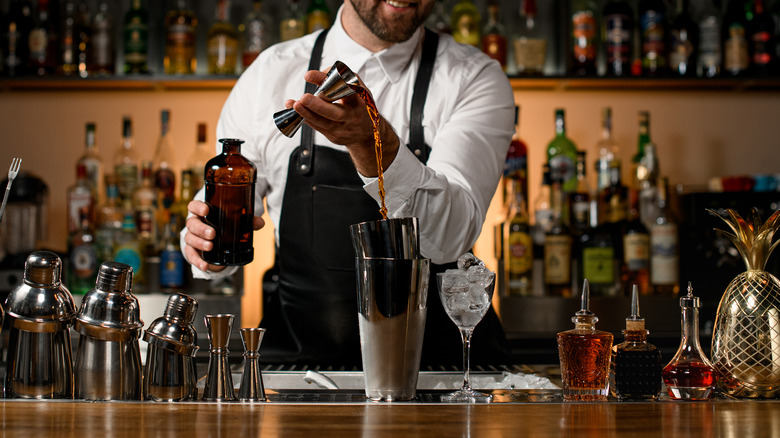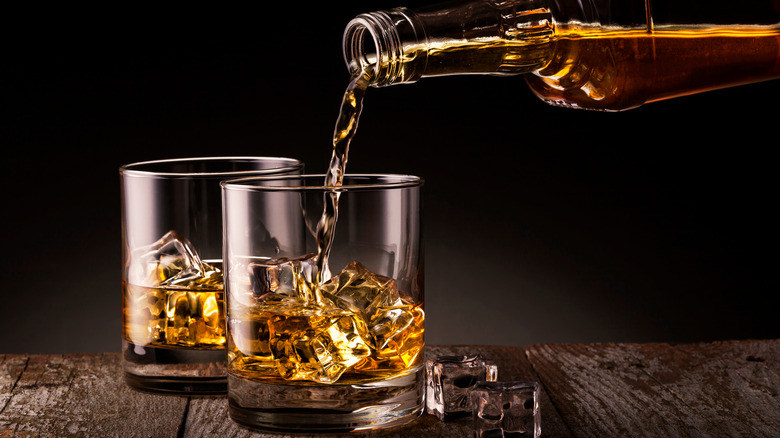12 Cocktail Ordering Mistakes That Are Confusing Your Bartender
You make your way up to the bar, grab a seat, and wait to get the bartender's attention. Finally, they lock eyes with you and ask what you'd like to drink — and you totally freeze. Or you order your drink confidently, only to be met with a confused expression (or worse — the cold shoulder) from your bartender. If you've found yourself in either of these scenarios, you're not alone. Ordering at a bar can be intimidating, and there's plenty of room for error, especially if you're not familiar with the establishment's specialty.
After years of bartending and serving drinks in high-end cocktail bars, grungy rock clubs, and many in between, I've served thousands of patrons, and I've noticed the mistakes they make over and over again. If you've fallen victim to perplexed glances or a chilly vibe from your bartender, it's not because they don't feel like serving you (at least, it shouldn't be) but likely because you've ordered in a manner that requires follow-up questions, explanation, or a guessing game. Your bartender wants to serve you a drink you'll love, but in order to do so, they need to understand your order.
To make the process as seamless as possible for them, and your drink as enjoyable as possible for you, it's helpful to know the common pitfalls of bar-goers. Read on to learn about twelve sneaky mistakes you may be making, and how avoiding them can improve your bar experience.
1. Using obscure drink names
We've all heard those silly, bizarre cocktail names. String any two words or terms together, and it's likely someone's used the phrase as the name of a drink at some point. Sure, ridiculous cocktail names can be fun, but they can also be perplexing to your bartender. These names often vary based on establishment and geographic location — and because there are literally thousands of them, no bartender has memorized every cocktail recipe known to man.
Especially at busy establishments, bartenders are working at the speed of light, serving their customers as quickly as possible to ensure everyone has what they need. If you step up to the bar and ask for an obscure off-menu cocktail like a Dirty Monkey (yes, it's a thing), your bartender is probably going to have to go look it up. In the best-case scenario, it'll take a few extra minutes to get your drink. In the worst case, they're going to ask you to pick something else. Similarly, if you order a Cape Cod rather than simply saying "vodka cranberry, please," you're forcing them to think that extra few seconds about what it is you want. Most bartenders will oblige an unusual request if they have the time, but when in doubt, keep your order simple.
2. Asking them to make your drink strong
You might be craving a stiff drink, but asking your bartender to make your mixed drink or cocktail "strong" isn't the way to get one. It's not because your bartender's being stingy, but rather because they've been instructed on how much liquor they can serve in every drink, and straying from the rule can get them into hot water with their employer. In order for a bar to stay in business, they need to make a profit. And to make a profit, they need to price their goods accordingly. There's quite a bit of math involved but, put simply, every pour of liquor is priced out. A heavy pour makes a mess of the math, resulting in a loss of revenue for the bar (and potentially hefty consequences for the offending bartender).
So, what's the solution? Just as you'd expect to pay if you ordered extra food, expect to pay for extra alcohol. If you're craving a strong drink, simply ask for a double and expect to be charged for it. Sometimes, the pour will cost you double, but sometimes, especially when ordering a double mixed drink, you're looking at an up-charge that's slightly less than the cost of two separate drinks. Of course, these can sneak up on you, so remember to drink responsibly.
3. Telling them to surprise you
While there's nothing wrong with ordering a "dealer's choice" cocktail or asking your bartender for their recommendation, simply asking them to surprise you is likely going to throw your bartender off. Unless you're a bona fide regular, they don't know your taste. Do you like beer or wine? Whiskey or vodka? Spirits-based cocktails or fruity blended drinks? Everyone's a little different, and your bartender won't be able to guess what type of flavors you like based on your appearance.
If you're not sure what kind of cocktail you want, try checking the cocktail menu first. Odds are, they'll have something new and interesting that's suited to your taste. If none of those options intrigue you, feel free to ask your bartender if they have time to make you something special. However, instead of asking them to surprise you, think about what you like and ask them to make you something similar. If you like Gimlets, for example, try asking if they can suggest a citrusy gin-based cocktail. Being specific about your preferences will not only give your bartender clarity but also up your chances of getting a cocktail you love.
4. Failing to read the room
Most bars don't take a one-size-fits-all approach. Some sling beer and basic mixed drinks day in and day out; others specialize in classic cocktails or innovative ingredients. If you fail to read the signals when you order at an establishment, you could be baffling your bartender. Just as some high-end cocktail bars may not have Apple Pucker on hand, your local sports bar probably doesn't carry that fancy aperitif you just learned about.
To avoid confusion or a potentially awkward exchange, take a glance around. If the shelves behind the bar are dotted with high-end spirits and liqueurs, or if the cocktail menu features lots of specialty ingredients, then you're probably safe to order that fancy classic cocktail you've been dying to try. On the flip side, if you have to shout your order over the music or the crowd, or if everyone around you is sipping domestic beer from a bottle, you might think twice before asking them to make you a Ramos Gin Fizz.
5. Asking questions the menu could answer
"What beers do you have on draft?" "Do you serve any good gin cocktails?" "Do you have pinot grigio?" If you walk up to a busy bartender and belabor the exchange with this type of question, you might get a sideways glance in return. Most bars have a draft beer list, wine list, cocktail list, or some combination of these. You'll likely be handed one upon sitting down, but if you're not, feel free to ask for one.
It's not that bartenders don't want to answer your questions, but rather that they're usually managing several customers and requests at once. They probably don't have time to rattle off twenty draft beers or wine offerings, and they'll be grateful if you check the menu before asking general questions about what's on offer.
If that's not enough to convince you, keep in mind that checking the menu before asking questions isn't just for the bartender's benefit. Asking if they have any pinot grigio might get you a glass in return, but what if that glass costs twice as much as you planned on paying? Checking the menu is a surefire way to save your bartender time and energy and ensure you're getting exactly what you want.
6. Not knowing how you like your martini
Mixing a martini is an art form, and it pays to know how to order one properly. Vodka or gin? Olive or twist? Wet or dry? These are all questions your bartender will have when you order a classic martini. Specifying them as you order will save them a lot of guesswork and give them a clear idea of what it is you want in a drink (and what you don't).
Seasoned martini drinkers have their order down pat, but that shouldn't discourage you from ordering one for the first time. Here's what you need to know: A classic martini is made up of vodka or gin and dry vermouth stirred with ice, strained, and finished with a garnish. At a minimum, try to specify whether you'd like vodka or gin. If you don't have a specific brand in mind, your bartender will be able to recommend one. We'd also recommend knowing whether you prefer your drink garnished with an olive or a twist. A twist of lemon rind will bring bright, citrusy notes, and an olive will give your drink a hint of brininess.
After you've tried a couple of renditions, you can branch out and try a wet martini (which uses more than the standard amount of vermouth) or a dry one (which uses less). If you find you love the brininess that comes with an olive garnish, try a dirty martini, which incorporates olive juice and results in a brilliantly sharp, salty drink.
7. Ordering complicated cocktails off-menu
Most bartenders have a good hold on the classics, their house specialties, and most popular drink orders. But no matter how prolific your bartender, or how well-stocked their bar, they won't be able to mix every drink under the sun. Asking them to whip up a drink recipe you saw featured in your favorite magazine, or asking for a signature cocktail from another bar's menu, is setting them up to be majorly confused — and most likely setting you up for disappointment.
Many specialty cocktails call for highly specific house-made ingredients or unusual liqueurs that aren't mainstays in most bars. Depending on the establishment, they may not have immediate access to the fig and rosemary syrup or obscure aperitif that the recipe calls for. If you loved a drink that you tried somewhere else, or saw a recipe that sparked your interest, try simply asking your bartender if they can recommend something similar. That way, they'll be more prepared to make you a drink you love.
8. Ordering another round without specifying
Bartenders have notoriously good memories, but especially if there are multiple people in your party, they likely don't remember what you last ordered. If you're having a great time at a bar, it's easy to feel like you and your party are the only ones there — but to a bartender, you're one of many. That doesn't mean they won't do their best to make you feel attended to, but it does mean they've got a lot of drink orders to keep track of. Instead of ordering "another round," be sure to specify what it is you want another round of.
Of course, there are exceptions to this. If you asked for their recommendation on a cocktail and can't remember exactly what they served you, they'll work with you to figure it out. And if you have an open tab, they might be able to look up what you last ordered. That being said, each of these instances can still cost you both time and confusion. If you want to be sure you're getting the right beer, wine, or cocktail when you order another round, be sure to specify what you're drinking.
9. Asking for something fruity
We'll never shame you for drinking a fruity cocktail — we can't all be Old Fashioned fanatics — but there's a right and a wrong way to order one. Odds are, strolling up to the bar and asking for "something fruity" or "something sweet" isn't going to give your bartender enough to work with. For starters, what spirits do you prefer? What kind of flavors do you gravitate toward? Are you looking for a fruity drink because you're craving a sweet treat, or because you want to mask the taste of the alcohol?
These are all questions your bartender will have when you order a fruity cocktail, and rather than force them to guess or interview you on your preferences, it's best to be more specific when you order. For example, you could ask for a fruit-forward vodka cocktail. Or tell your bartender you love piña coladas and ask if they can make you something similar. The more specific you can be with your order, the less you'll risk confusing your bartender (and the more likely you'll be to get a drink that satisfies your taste buds).
10. Ordering wine by the color
You don't have to be a sommelier to order wine at a bar, but you should at least know what type of varietal or flavor profile you're after. If you simply ask your bartender for "red wine" or "white wine," you're not only going to confuse them, but you also run the risk of getting a wine that's not suited to your taste. The establishment you're visiting likely has several — if not dozens — of options, and this isn't something you want to leave up to chance.
If you're not sure what type of wine you're after, first look at the wine list. Wines will often be listed by varietal, and some lists even include tasting notes. Try perusing the options and narrowing your focus before asking your bartender for help. If you can include some of your personal preferences in your question, even better. For example, asking them to recommend their favorite Chardonnay will get you much further than asking for white wine and leaving it up to chance.
11. Giving instructions on how to make your drink
We all have preferences on how to mix our drinks at home, but bartenders are trained on proper cocktail construction and house processes. For example, most professionals are instructed on what order to add ingredients to a cocktail tin (least costly to most costly) and to always add ice to the tin last (to avoid watering down spirits prematurely). Looking over their shoulder and telling them to change their process not only breeds confusion, but it could hinder the final product.
You wouldn't stroll into the kitchen and tell the chef how to make your food, would you? Sure, you might ask them to cook your steak medium-rare or request your salad dressing on the side, just as it's perfectly acceptable to ask your bartender to make your martini dry or request bourbon instead of rye whiskey in your Manhattan. In short, a request to suit your preferences is fine, but the last thing a bartender needs is a customer looking over their shoulder and telling them to muddle their mint more aggressively.
12. Not knowing your ice
Do you know your ice terminology? Especially if you're venturing into the world of more expensive spirits, it pays to get it right. Not only will your bartender be grateful for the clarity, but you'll ensure you're getting exactly what you want. Generally speaking, there's a universal language spoken among bartenders and bar-goers. "On the rocks" means you want your spirit served on ice. "Up" means you want it stirred with ice and chilled, then strained and served on its own in a glass. And "neat" simply means you want a straight pour of whatever it is you're ordering.
Now, say you order that expensive whiskey (or bourbon) you've had your eye on "up." Your bartender will stir your whiskey with ice before serving it to you, watering down and chilling the spirit. There's nothing wrong with this, per se, unless you actually wanted your whiskey served on its own in a glass at room temperature, or "neat." Your bartender can't un-chill your drink, and if it was a costly pour, they may not be allowed to fetch you a fresh one. To avoid this mix-up, commit these terms to memory and be sure to specify when you order. Your bartender will have a clear idea of what you want, and you'll be able to enjoy the spirit exactly as you intended. Talk about a win-win.
